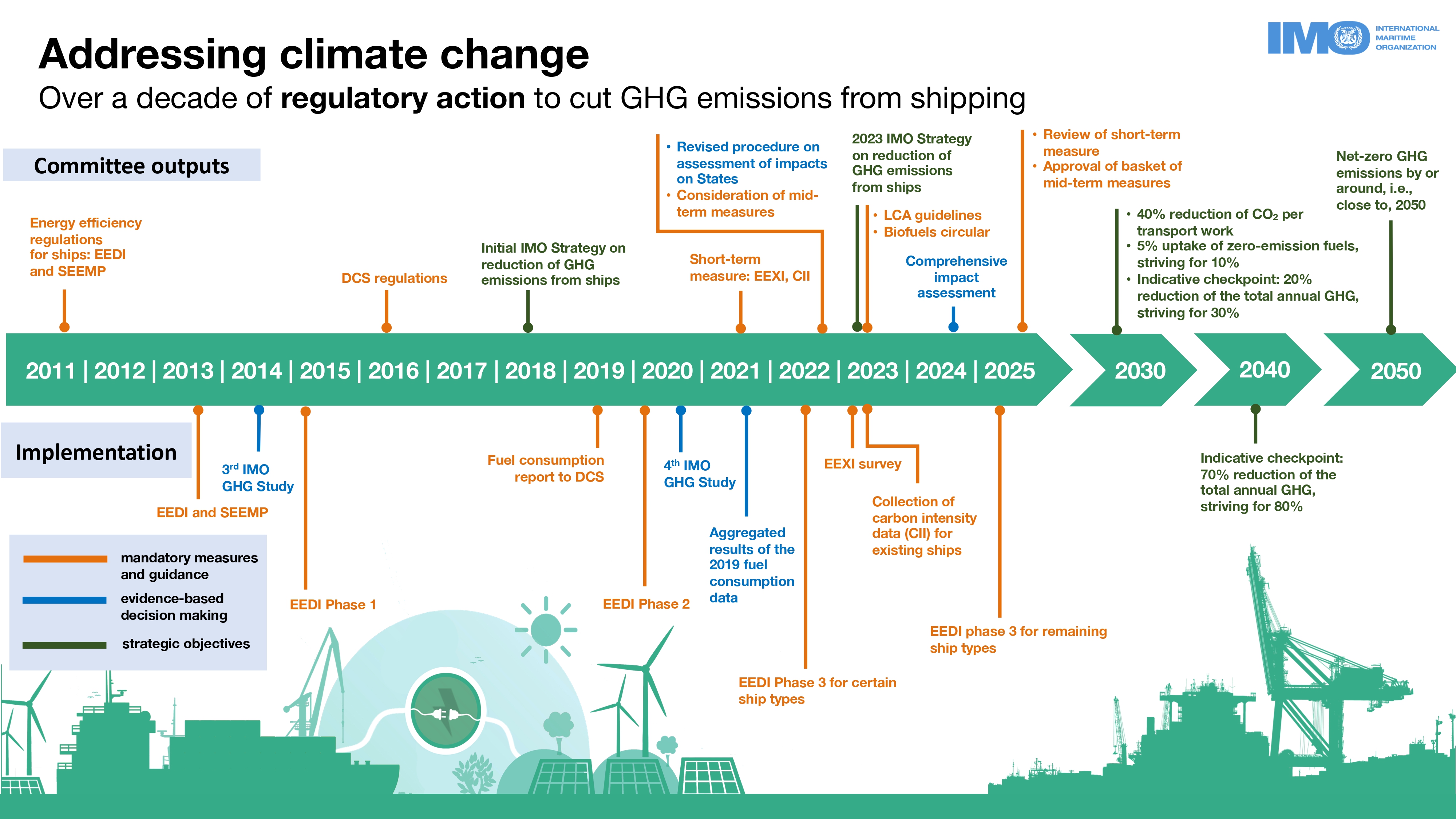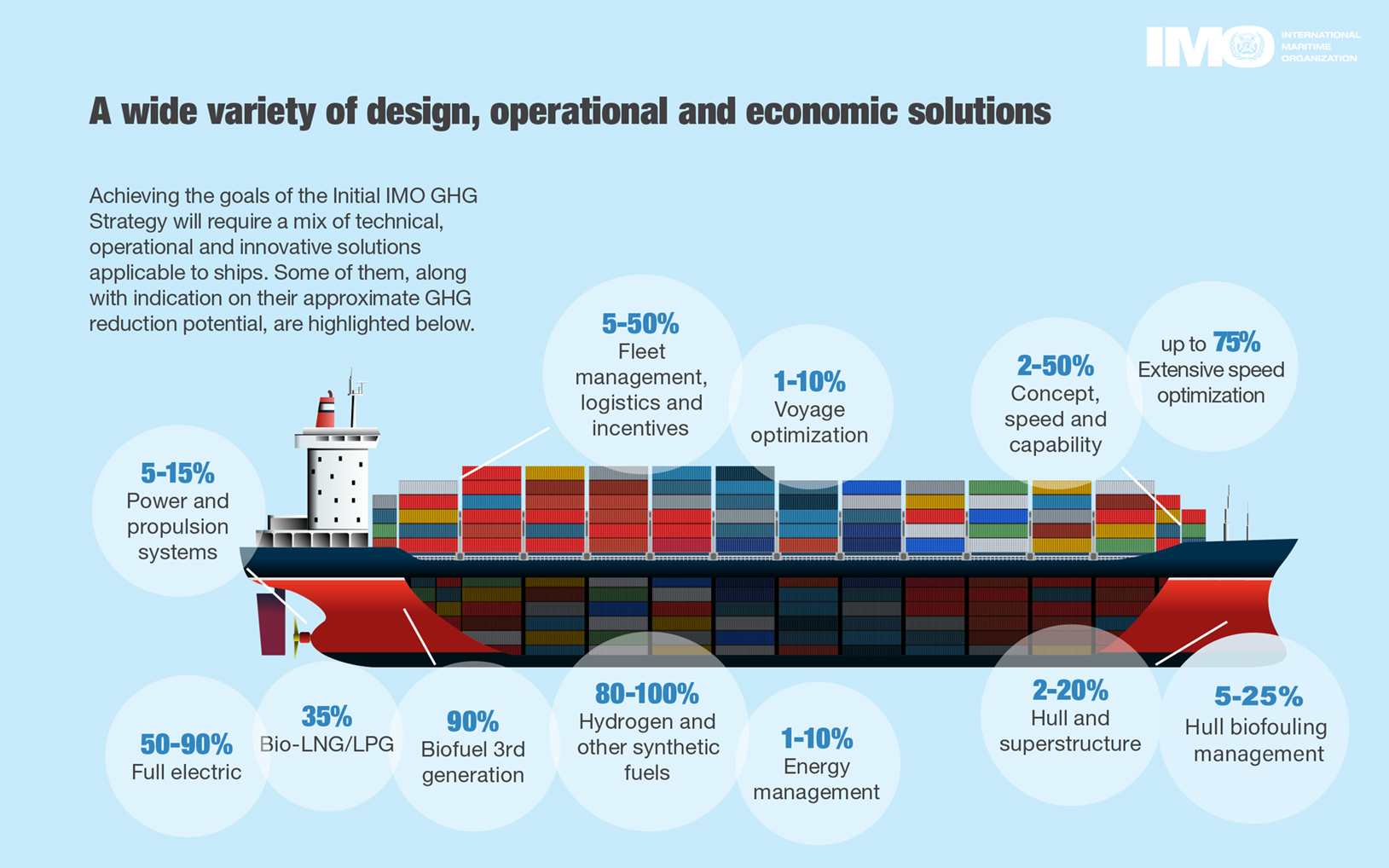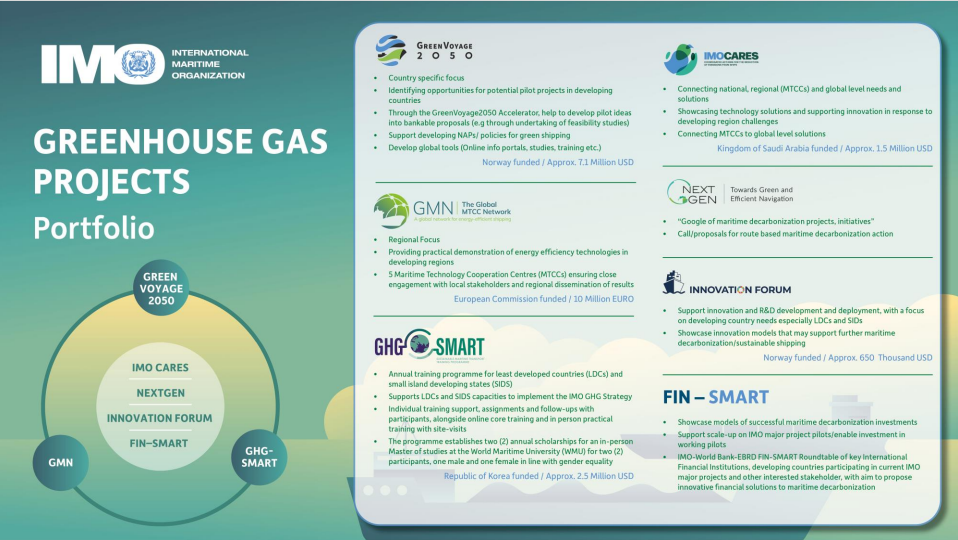IMO’s work to cut GHG emissions from ships

Acting to cut emissions from ships
IMO is committed to supporting UN Sustainable Development Goal 13 - to take urgent action to combat climate change and its impacts - and the Paris Agreement by reducing greenhouse gas (GHG) emissions from shipping.
In 2023, IMO adopted the 2023 IMO GHG Strategy, building on the Initial GHG Strategy (2018) and the first mandatory energy efficiency measures for ships introduced in 2011.
To support implementation, IMO runs capacity-building programs and global projects. Read more here.
Getting onboard the green shipping revolution
Discover the innovative technologies and transformative approaches shaping the future of sustainable shipping!
What is the 2023 IMO Strategy on Reduction of GHG Emissions from Ships?
IMO Member States adopted the 2023 IMO Strategy on Reduction of GHG Emissions from Ships during the Marine Environment Protection Committee (MEPC 80) session, updating the Initial GHG Strategy (2018) with enhanced targets to tackle harmful emissions from shipping.
The 2023 IMO GHG Strategy represents a framework for Member States, setting out the future vision for international shipping.
This Strategy sets clear targets and actions to decarbonize international shipping: Net-zero GHG emissions from international shipping by or around, i.e. close to 2050.
Indicative check-points: The Strategy includes indicative check-points for international shipping to reach net-zero GHG emissions for 2030 (by at least 20%, striving for 30%) and 2040 (by at least 70%, striving for 80%) compared to 2008.
Carbon intensity improvements: the 2023 IMO GHG Strategy envisages a reduction in carbon intensity of international shipping (to reduce CO2 emissions per transport work), as an average across international shipping, by at least 40% by 2030.
Alternative zero and near-zero GHG fuels: The Strategy sets a new level of ambition which relates to the uptake of zero or near-zero GHG emission technologies, fuels and/or energy sources: they are to represent at least 5%, striving for 10%, of the energy used by international shipping by 2030.
To support these objectives, the Strategy emphasizes capacity building, technical cooperation, and research and development.
A review of the strategy is scheduled for autumn 2028, with a view to adoption of the 2028 IMO Strategy on reduction of GHG emissions from ships.
More details about the 2023 IMO GHG Strategy are available here.
Full text of the 2023 IMO GHG Strategy can be downloaded here.
The downloadable infographic below outlines key regulatory and implementation steps taken by IMO since 2011 with projection to 2050.
What are the 2023 candidate mid-term GHG measures?
The 2023 IMO GHG Strategy outlines a set of "mid-term measures" (which build on previously adopted "short-term measures") aimed at reducing greenhouse gas emissions from international shipping in line with the reduction targets set out in the Strategy. These measures should consist of:
a technical element, namely a goal-based marine fuel standard regulating the phased reduction of the marine fuel's GHG intensity; and
an economic element, on the basis of a maritime GHG emissions pricing mechanism.
IMO net-zero framework
In April 2025, the Marine Environment Protection Committee 83rd session (MEPC 83) finalized a draft legal text for these measures, referred to as the "IMO Net-Zero Framework". This consists of amendments to Annex VI of the MARPOL Convention, approved by MEPC 83 for circulation to Member States, with a view to adoption by an extraordinary session of MEPC (MEPC/ES.2) in October 2025. Following adoption, the measures are expected to enter into force 16 months later, under the "tacit acceptance" procedure.
See: IMO approves net-zero regulations for global shipping
Circular letter to Member States:  Circular Letter No.5005 - Draft Revised Marpol Annex Vi (Secretariat).pdf
Circular Letter No.5005 - Draft Revised Marpol Annex Vi (Secretariat).pdf
The mid-term GHG reduction measures should effectively promote the energy transition of shipping and provide the world fleet with an incentive while contributing to a level playing field and a just and equitable transition.
Comprehensive impact assessment of mid-term measures to reduce GHG emissions
The proposed mid-term measures will impact the world fleet and Member States, especially Least Developed Countries (LDCs) and Small Island Developing States (SIDS). To guide decision-making, a comprehensive impact assessment was conducted over 2023/2024, focusing on the potential impacts of the candidate measures on the world fleet and on States. Read more here.
What's the timeline for adopting pricing mechanisms?
The 2023 IMO GHG Strategy includes a timeline for adoption of the mid-term measures:
Spring 2025: approval of mid-term measures at MEPC 83 (completed);
Autumn 2025: adoption of mid-term measures at an extraordinary session of the MEPC;
2027 (16 months after adoption): entry into force of mid-term measures.
Read more here about the proposed measures.
What is the short-term measure to reduce GHG emissions?
IMO's short-term GHG reduction measures (EEXI, CII rating), developed to improve ship energy efficiency and reduce carbon intensity by at least 40% compared to 2008 levels by 2030, entered into force on 1 January 2023.
The review process started in 2023 and included a data gathering and analysis stage, and a convention and guidelines review stage. In April 2025, the MEPC 83 is expected to finalize phase 1 of the review of relevant provisions of MARPOL Annex VI and associated mandatory guidelines, and develop a work plan for Phase 2 of the review, starting on 1 January 2026. Read more here.
What are the latest developments?
The Marine Environment Protection Committee (MEPC 83) met from 7 to 11 April 2025, where it approved the mid-term measures and progressed the review of the short-term measure to reduce GHG emissions.
Support for developing countries
The 2023 IMO GHG Strategy acknowledges the challenges that developing countries, in particular least developed countries (LDCs) and small island developing States (SIDS), may face in the implementation of the Strategy. IMO, with funding assistance from Member States, provides support for LDCS and SIDS through a series of capacity-building and technical cooperation programmes.
What is the next stage for IMO's GHG Strategy?
Next steps:
- Extraordinary session of MEPC (Autumn 2025) - Adoption of mid-measures
MEPC 84 (Spring 2026) - Approval of detailed implementation guidelines
Target dates:
MEPC 85 (Autumn 2026)
16 months after adoption of measures (2027) - Entry into force of measures (first calendar year for IMO Net-Zero Framework is 2028)
MEPC 86 (Summer 2027) - Initiate the review of the 2023 IMO GHG Strategy
MEPC 87 (Spring 2028)
MEPC 88 (Autumn 2028) - Finalization of the review of the 2023 IMO GHG Strategy with a view to adoption of the 2028 IMO Strategy on reduction of GHG emissions from ships.
IMO climate events
IMO hosts and co-organizes climate conferences and events to support implementation of the GHG strategy - see more information here.
IMO at COP - UNFCCC
IMO contributes to international action led by the United Nations to address climate change, including by attending UN Framework Convention on Climate Change (UNFCCC) COP meetings.
Read more here on IMO and UNFCCC and see links to IMO at COP.
Latest figures on GHG emissions from shipping
The IMO 4th GHG study (2020) provides the latest statistics on GHG emissions from shipping. Key findings and a link to download the full report are available here.
The Fifth IMO GHG Study is under development to provide updated data.
See also:
Study on the readiness and availability of low- and zero-carbon ship technology and marine fuels Summary report of the study
Mandatory energy efficiency requirements - what ships must do
Under a framework developed as part of the 2018 Initial IMO Strategy on Reduction of GHG Emissions from Ships, technical and operational amendments to the International Convention for the Prevention of Pollution from ships (MARPOL) Annex VI require ships to improve their energy efficiency in the short term and thereby reduce their GHG emissions.
In simple terms, these measures are aimed at achieving the carbon intensity reduction aims of the Initial IMO GHG Strategy.
On 1 January 2023 it became mandatory for all ships to calculate their Energy Efficiency Existing Ship Index (EEXI) and to establish their annual operational carbon intensity indicator (CII) and CII rating. In other words, ships get a rating of their energy efficiency (A, B, C, D, E – where A is the best). A ship running on a low carbon fuel gets a higher rating than one running on fossil fuel.
There are many things a ship can do to improve its rating, such as hull cleaning to reduce drag; speed optimization; installation of low energy light bulbs; installation of solar/wind auxiliary power for accommodation services; etc.
Read more about EEXI and CII ratings here.
Alternative fuels
Low- and zero-carbon fuels will be needed to decarbonize shipping. See the results of a future fuels mapping exercise here.
There is great potential for developing countries to become key suppliers of zero and near zero carbon fuels for shipping, and other technologies.
Potential future fuels and propulsion for shipping include ammonia, biofuels, electric power, fuel cells, hydrogen, methanol, and wind.
For different fuel options, there is a need to consider issues such as safety, regulation, pricing, infrastructural availability, lifecycle emissions, supply chain constraints, barriers to adoption and more.
Download a workshop package on alternative fuels here. The workshop considers potential production pathways, emission reduction potential, infrastructure and onboard requirements, as well as implications on cost. The overall aim is to better understand some of the possible alternative fuels in the future marine fuel mix and assess opportunities and any barriers to each option.
IMO has adopted Guidelines on life cycle GHG intensity of marine fuels (LCA guidelines) - read more about these here). These allow for an assessment of greenhouse gas emissions from the fuel production to the ship (Well-to-Wake), from primary production to carriage of the fuel in a ship's tank (Well-to-Tank, also known as upstream emissions) and from the ship's fuel tank to the exhaust (Tank-to-Propeller or Tank-to-Wake, also known as downstream emissions). Work continues on the development of the Life Cycle GHG Assessment (LCA) framework.
Candidate future low-carbon and zero-carbon fuels for shipping have diverse production pathways - for example, different generations of biofuels, hydrogen-based fuels - entailing significant differences in their overall environmental footprint.
Read more: IMO Symposium on alternative fuels.
Future fuels and technology website
Access to latest information on zero and near-zero marine fuels and technologies, including pricing information and the latest research, can be found on futurefuels.imo.org.
The website has been developed by the Future Fuels and Technology Project (FFT Project), a partnership project between IMO and the Republic of Korea.
Download Study on the readiness and availability of low- and zero-carbon ship technology and marine fuels Summary report of the study
Safety matters
The IMO Maritime Safety Committee (MSC) has included on its agenda, an output on "Development of a safety regulatory framework to support the reduction of GHG emissions from ships using new technologies and alternative fuels", starting with MSC 108 (mid-2024).
A correspondence group has been established to: identify and update a list of fuels and technologies which will assist international shipping to support the reduction of GHG emissions from ships using new technologies and alternative fuels; conduct an assessment for each identified fuels and new technologies (e.g. the state of knowledge of risks and the technical considerations of solutions, Hazards and Risks, Risk Control Measures) in relation to persons, ships (new built and converted) and applicable operations for the same, from e.g. projects applying alternative design and approval process where permitted; based on the outcomes, develop a record for safety obstacles and gaps in the current IMO instruments that may impede the use of the alternative fuel or new technology. This work is ongoing and the correspondence group will submit a report to MSC 110 in June 2025.
The IMO Sub-Committee on Carriage of Cargoes and Containers (CCC) has already been playing a vital role in the development of technical provisions for alternative fuels and related technologies, ensuring that safety implications and potential risks associated with the use of alternative fuels and related technologies are duly addressed. Guidelines already developed include: Interim guidelines for the safety of ships using methyl/ethyl alcohol as fuel (MSC.1/Circ.1621); Interim guidelines for ships using fuel cells (MSC.1/Circ.1647); interim guidelines for the safety of ships using LPG fuels (MSC.1/Circ.1666 ) and Interim Guidelines for the safety of ships using ammonia as fuel (MSC.1/Circ.1687).
The following video outlines the importance of transitioning to low- and zero-carbon fuels and renewable energy sources to power ships:
Supporting innovation
Shipping will undoubtedly need new technologies, new fuels and innovation to meet the GHG targets. There needs to be investment in R&D, infrastructure and trials.
A range of IMO-executed projects is addressing this, focusing on supporting developing countries to implement MARPOL Annex VI energy efficiency measures and promoting trials and training.
IMO climate action projects list:
GreenVoyage2050 Project https://greenvoyage2050.imo.org/
Global Industry Alliance (GIA) to Support Low Carbon Shipping https://greenvoyage2050.imo.org/about-the-gia/
IMO-European Union GMN (Global Maritime Network of Maritime Technology Cooperation Centres) project https://gmn.imo.org/
GEF-UNDP-IMO GloFouling Project which addresses the issue of hull fouling that contributes to GHG emissions https://www.glofouling.imo.org/
Global Industry Alliance (GIA) for Marine Biosafety https://www.glofouling.imo.org/gia
SMART-C GHG project https://smart-c.imo.org/
IMO-EBRD-World Bank FIN-SMART roundtable – co-led by IMO, the European Bank for Reconstruction and Development and the World Bank https://www.imo.org/en/MediaCentre/Pages/WhatsNew-1579.aspx
IMO-UN Environment Programme (UNEP)-Norway Innovation Forum https://www.imo.org/en/OurWork/PartnershipsProjects/Pages/Innovation-Forum.aspx
IMO-Germany Asia Maritime Transport Emissions project (known as the Blue Solutions Project) IMO-Germany project to cut maritime transport emissions in Asia
IMO-Singapore NextGEN nextgen.imo.org/
IMO Coordinated Actions to Reduce Emissions from Shipping (IMO CARES) (Kingdom of Saudi Arabia)
Future Fuels and Technology for Low- and Zero-carbon Shipping Project https://futurefuels.imo.org/
Carbon capture and storage
As the Secretariat for the London Convention and London Protocol, IMO regulates carbon capture and storage (CCS) beneath the seabed to mitigate the impacts of increasing concentrations of carbon dioxide (CO2) in the atmosphere, as well as ocean fertilization and other marine geoengineering activities.
CCS is a technology that aims for the permanent isolation and storage underground (sequestration) of CO2. CCS has been regulated by the London Protocol since 2006.
Marine geoengineering
In 2013, the London Protocol was amended to regulate ocean fertilization. This will, when in force, provide a legally binding mechanism to regulate the placement of matter for ocean fertilization, while also "future-proofing" the LP to enable regulation of other marine geoengineering activities that fall within its scope. Read more here.
Onboard carbon capture (OCC)
An area of growing interest is that of onboard carbon capture (OCC). The MEPC is considering several proposals related to the technology and how its regulation might be accommodated within IMO's current regulatory framework.
Read more here on how global regulation can deal responsibly with climate change mitigation technologies to protect the marine environment.



